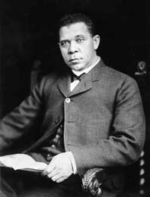| Tuskegee
University a private,
historically black college located on 5,000 acres
in Tuskegee, Alabama

Tuskegee offers a total of 49
degrees (39 Bachelor's, 13 Master's, 2 Doctor's
of Philosophy) in five colleges -- Agricultural,
Environmental and Natural Sciences; Business and
Information Services; Engineering, Architecture
and Physical Sciences; Liberal Arts and
Education; Veterinary Medicine, Nursing and
Allied Health. Tuskegee is also home to the
National Center for Bioethics in Research and
Health Care, the nation's first bioethics center
devoted to engaging the sciences, humanities, law
and religious faiths in the exploration of the
core moral issues which underlie research and
medical treatment of African-Americans and other
underserved people. It opened two years after
President Bill Clinton apologized on behalf of
the nation for the federal government's use of
399 poor African-American sharecroppers in a
study on the treatment and natural history of
syphilis, most of them without their knowledge,
from 1932 to 1972.
 History History
Tuskegee was the brainchild of
Lewis Adams, a former slave, and George W.
Campbell, a former slave owner. Adams could read,
write and speak several languages despite having
no formal education, and was an acknowledged
leader of the African-American community in Macon
County. He was concerned that former slaves would
be unable to support themselves if they were not
educated; Campbell agreed and contributed what
resources he could to make Adams' dream come
true.
The dream became reality when
W.F. Foster, a white candidate for the Alabama
Senate, asked Adams what he would want in return
for the black vote in Macon County. Adams said he
wanted a normal (teaching) school for free men
and freed slaves. After Foster and fellow
candidate Arthur L. Brooks were elected they
followed through on their promise and got
legislation passed authorizing $2,000 to create
the school. An organizing committee was formed,
which hired Booker T. Washington, a former slave, to be the school's
first president; Washington would hold that
position until his death in 1915.
Tuskegee Normal and Industrial
School opened in space borrowed from a church on
July 4, 1881. The following year Washington
bought the grounds of a former plantation, and
the campus remains on that site to this day. The
first buildings were constructed by students,
many of whom were paid with a free education. In
1892 the Alabama Legislature passed a law giving
the Institute the right to act independent of the
State of Alabama.
The famed Tuskegee Airmen were
formed here in 1941.
The Tuskegee campus was
declared a National Historic Landmark on April 2,
1966, and became a National Historic Site on
October 26, 1974.
Tuskegee Institute became fully
accredited in 1985 and its name was formally
changed to Tuskegee University that same year.
Notable Graduates
name (year of degree) -- achievement
The
Commodores -- musical group
Ralph Ellison -- novelist and literary critic
Daniel "Chappie" James (1942) -- first
African-American to reach the rank of Four-Star
General, in 1975
Ray Nagin (1978) -- Mayor of New Orleans
Keenan Ivory Wayans -- actor, comedian and
television producer
The official website of Tuskegee University is
www.tuskegee.edu

Booker T. Washington
The
Commodores
Questions or comments about
this page?
|



